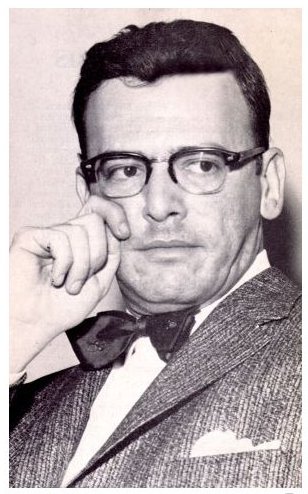

| Robert Parris (21 May 1924 – 5 December
1999) was a composer and professor of music. He was born in Philadelphia, attended the University of Pennsylvania, then the Juilliard School in New York. Among his teachers were Otto Luening, Aaron Copland, Jacques Ibert, and Peter Mennin (although he always claimed that the effect of these teachers on his own composing technique was 'minimal'). After a year of study on a Fulbright Fellowship in Paris (where he was meant to study with Arthur Honegger, but hardly ever saw him), and a year teaching at the University of Washington in Seattle, he settled in the Washington, D.C. area in 1952. Parris joined the faculty of The George Washington University in 1963 where he taught theory and composition. Parris liked to describe himself as a 'colorist', and therefore tended to write for small ensembles or a single instrument accompanied by piano or orchestra. His first international recognition came in 1958 with his Concerto for Five Kettledrums and Orchestra, premiered by tympanist Fred Begun and the National Symphony Orchestra in Washington, under Howard Mitchell. Parris was notorious for pushing instruments to the limits of any player's abilities: his Solo Violin Sonata is particularly difficult, and the composer-directors of CRI believed his Trombone Concerto to be unplayable until they heard a recording of it. But he was also the most inventive of orchestrators. Parris's Concerto for Kettledrums was always a crowd-pleaser in performance because it was so surprisingly melodic. Its last movement is built around a traditional hymn (like Copland's Appalachian Spring) but Parris gives the initial statements of that hymn — and its dramatic summation — to the kettledrums. Begun, the NSO principal tympanist who premiered the piece, made the original suggestion for the piece, but he later remarked, "I suggested five drums jestingly." In the sixties and seventies Parris was a sometime music critic for the Washington Post and the Washington Evening Star. In this period Parris — who taught himself Spanish — also turned to Borges for inspiration, and produced the Book of Imaginary Beings (Part I) a work for flute (pic), violin, cello, piano, celeste, and percussion, from 1972. Part II was published in 1983. A revival of the Concerto for Five Kettledrums and Orchestra, also in 1983, by the National Symphony Orchestra, under the direction of Mstislav Rostropovich, was such a success that it resulted in new performances of his Concerto for Trombone (first performed in 1964) by the NSO in 1985 and, then, to Parris's largest commission. His Symphonic Variations, performed in 1988 to great acclaim, was the result. A retrospective concert of his works at The George Washington University in this same year led Washington Post music critic Joseph McLellan to refer to Professor Parris as “one of (Washington’s) major music assets.” -- Names which are links on this
page refer to my Interviews elsewhere on my website. BD
|
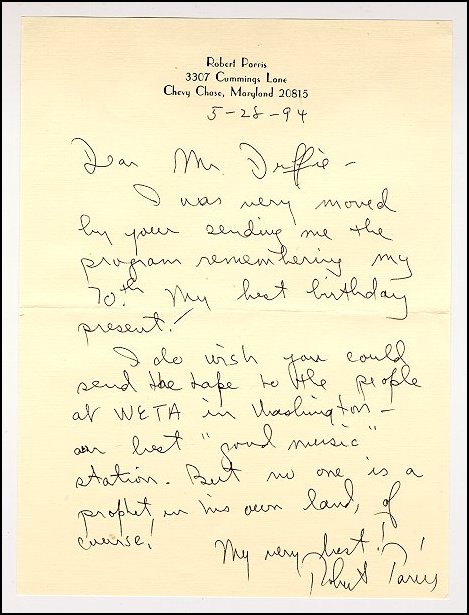 It is a pleasure to now be able to present the entire conversation on this
webpage . . . . . . . . .
It is a pleasure to now be able to present the entire conversation on this
webpage . . . . . . . . .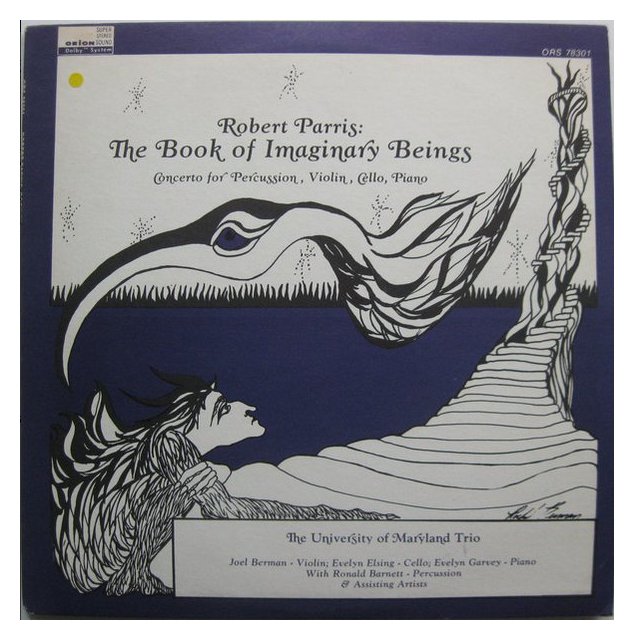 BD:
And you hope for this in your music?
BD:
And you hope for this in your music?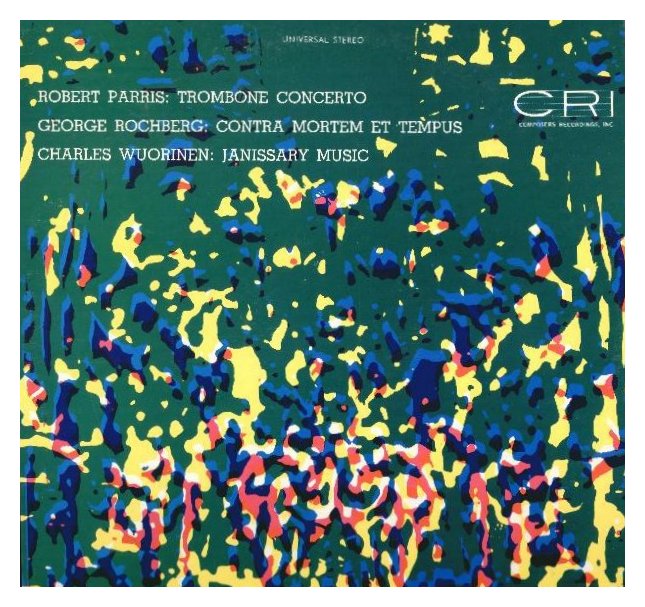 RP: I actually think that a piece shouldn’t be
all that hard that it takes that it takes that much time. A reasonable
number of hours... let’s say four or five rehearsals of three or four hours
each with professional musicians. More should not be necessary, but
I suppose there could be exceptions. I remember that Schoenberg demanded
it and got it for some of his later works. It could have been Pierrot Lunaire that I’m thinking of.
[There were forty rehearsals for that work.]
They went over it and over it and over it and over it.
RP: I actually think that a piece shouldn’t be
all that hard that it takes that it takes that much time. A reasonable
number of hours... let’s say four or five rehearsals of three or four hours
each with professional musicians. More should not be necessary, but
I suppose there could be exceptions. I remember that Schoenberg demanded
it and got it for some of his later works. It could have been Pierrot Lunaire that I’m thinking of.
[There were forty rehearsals for that work.]
They went over it and over it and over it and over it.| Olga Samaroff (August 8, 1880 –
May 17, 1948) was born Lucy Mary Olga Agnes Hickenlooper in San Antonio,
Texas, and grew up in Galveston, where her family owned a business later
wiped out in the 1900 Galveston hurricane. After her talent for the piano
was discovered, she was sent to Europe to study, since at that time there
were no great piano teachers in the United States. She first studied with
Antoine François Marmontel at the Conservatoire de Paris and later
with Ernst Jedliczka in Berlin. While in Berlin, she was very briefly married
to Russian engineer Boris Loutzky. After her divorce from Loutzky and the disaster which claimed her family's business, she returned to the United States and tried to carve out a career as a pianist. However, she soon discovered she was hampered both by her awkward name and her American origins. Her agent suggested a professional name change, which was taken from a remote relative. As Olga Samaroff, she self-produced her New York debut at Carnegie Hall in 1905 (the first woman ever to do so). She hired the hall, the orchestra, and conductor Walter Damrosch, and made an overwhelming impression with her performance of Tchaikovsky's Piano Concerto No. 1. She played extensively in the United States and Europe thereafter. 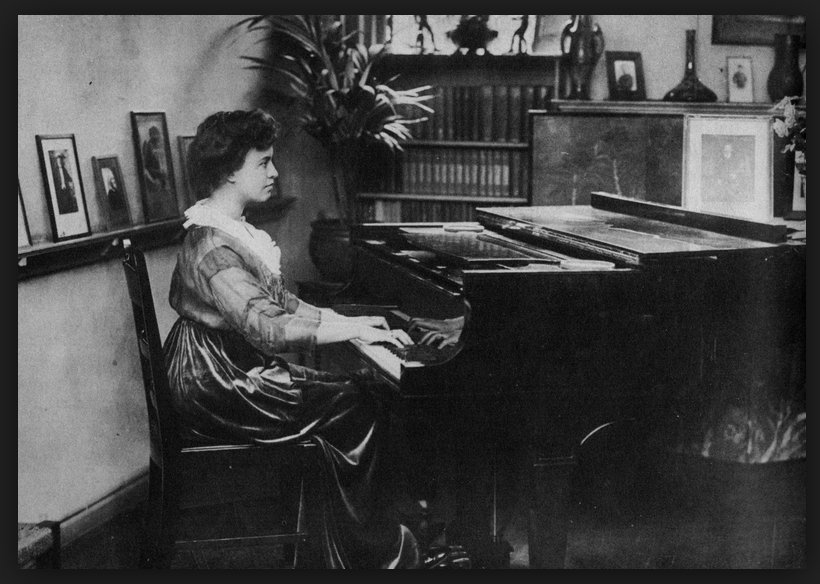
Samaroff discovered Leopold Stokowski (1882–1977) when he was church organist at St. Bartholemew's in New York and later conductor of the Cincinnati Symphony Orchestra. She played Tchaikovsky's Piano Concerto No. 1 under Stokowski's direction when he made his official conducting debut in Paris with the Colonne Orchestra on May 12, 1909. She married Stokowski in 1911, and their daughter Sonya was born in 1921. At that time, Samaroff was much more famous than her husband and was able to lobby her contacts to get Stokowski appointed in 1912 to the vacant conductor's post at the Philadelphia Orchestra, launching his international career. Samaroff made a number of recordings in the early 1920s for the Victor Talking Machine Company. Samaroff was the second pianist in history, after Hans von Bulow, to perform all 32 Beethoven piano sonatas in public, preceding Artur Schnabel (who did the series first in 1927) by several years. In 1923, Samaroff and Stokowski divorced; the reasons included Stokowski's infidelity, from which she never recovered. She took refuge in her friends, among whom were George Gershwin, Irving Berlin, Dorothy Parker, and Cary Grant. In 1925, Samaroff fell in her New York apartment and suffered an injury to her shoulder. The injury forced her to retire from performing. So from that point on, she worked primarily as a critic and teacher. She also wrote for the New York Evening Post until 1928, and she gave guest lectures throughout the 1930s. Samaroff developed a course of music study for laymen and was the first music teacher to be broadcast on NBC television. She taught at the Philadelphia Conservatory and in 1924, was invited to join the faculty of the newly formed Juilliard School in New York. She taught at both schools for the rest of her life. Called "Madam" by her students, she was an advocate for them. She supplied many of her Depression-era charges with concert clothes and food. She also pressed officials at Juilliard to build a dormitory – a project that was not realized until after her death decades later. Her most famous pupil was concert pianist William Kapell, who was killed in a 1953 plane crash at age 31. She herself said that the best pianist she ever taught was the New Zealander Richard Farrell, who also died at age 31, in a motor vehicle accident in England in 1958. Samaroff published an autobiography, An American Musician's Story, in 1939. She died of a heart attack at her home in New York on the evening of May 17, 1948, after giving several lessons that day. |
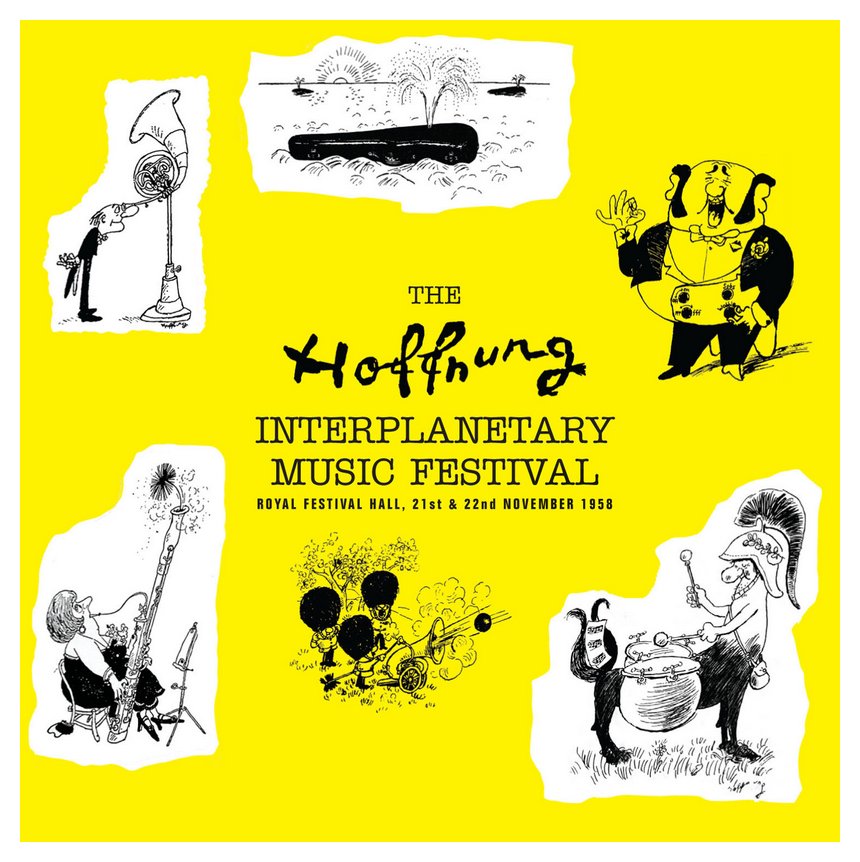
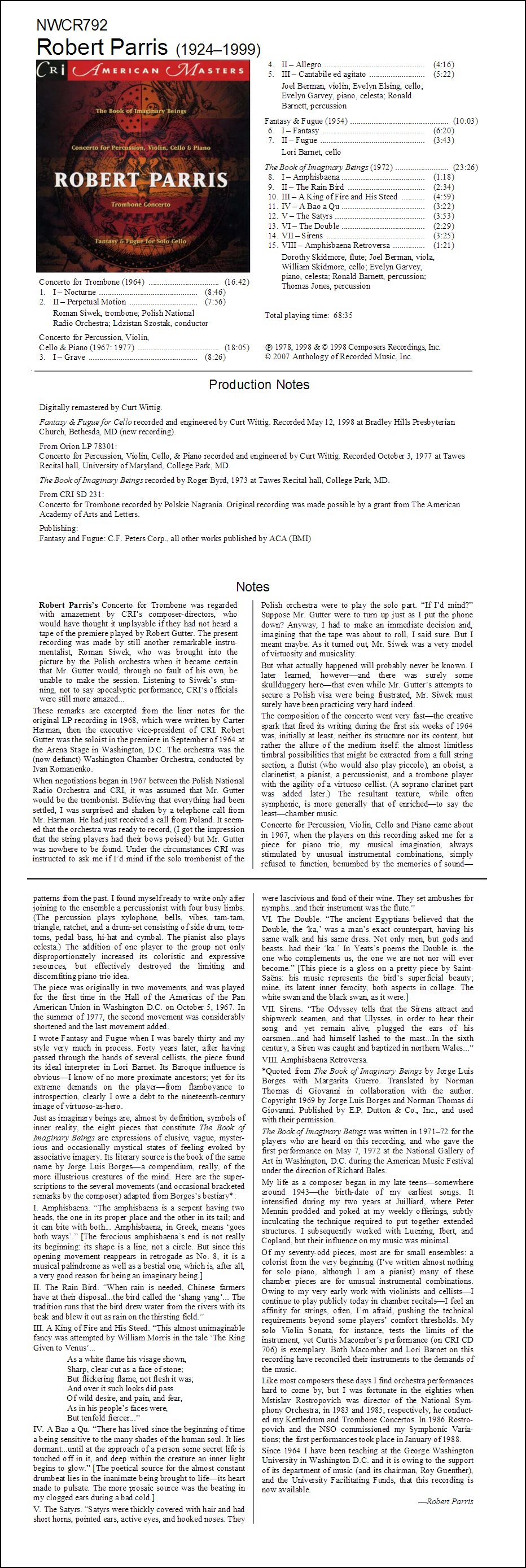
© 1988 Bruce Duffie
This conversation was recorded on the telephone on October 22, 1988. Portions were broadcast on WNIB the following year, and again in 1994 and 1999. This transcription was made in 2016, and posted on this website at that time. My thanks to British soprano Una Barry for her help in preparing this website presentation.
To see a full list (with links) of interviews which have been transcribed and posted on this website, click here.
Award - winning broadcaster Bruce Duffie was with WNIB, Classical 97 in Chicago from 1975 until its final moment as a classical station in February of 2001. His interviews have also appeared in various magazines and journals since 1980, and he now continues his broadcast series on WNUR-FM, as well as on Contemporary Classical Internet Radio.
You are invited to visit his website for more information about his work, including selected transcripts of other interviews, plus a full list of his guests. He would also like to call your attention to the photos and information about his grandfather, who was a pioneer in the automotive field more than a century ago. You may also send him E-Mail with comments, questions and suggestions.